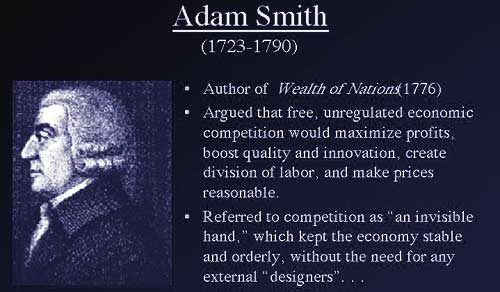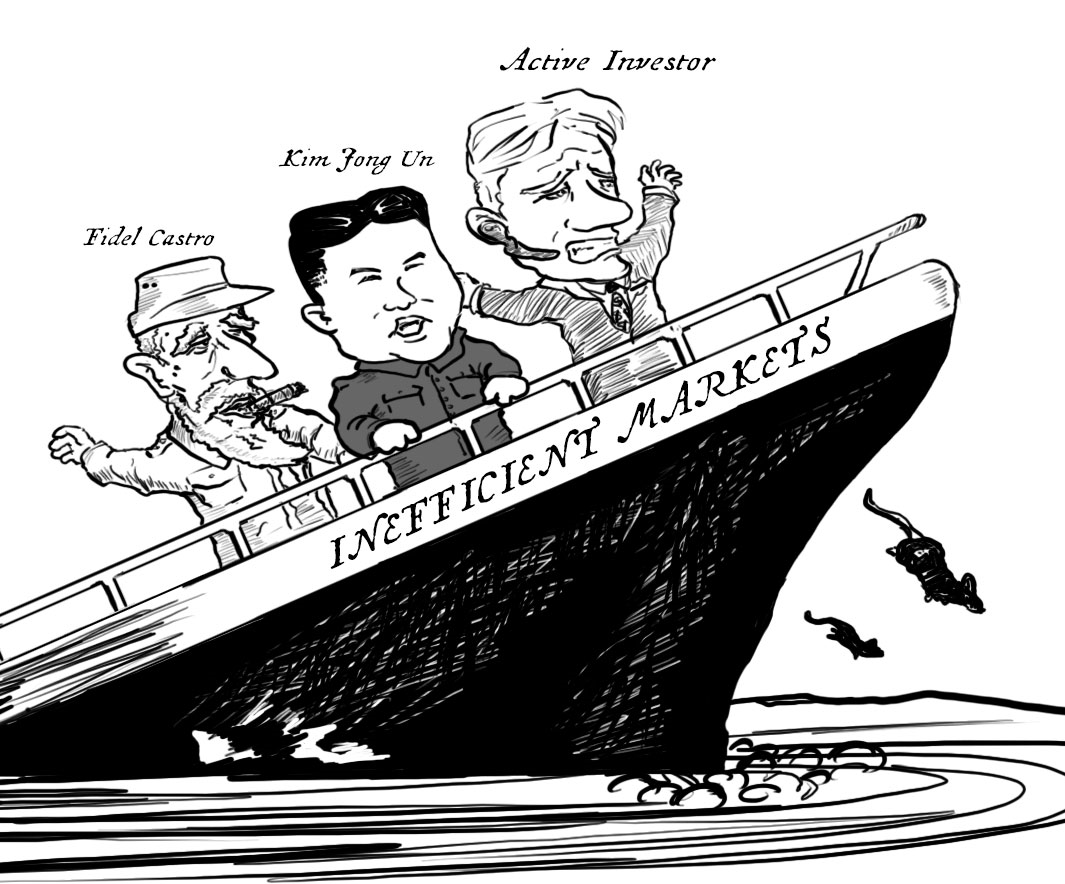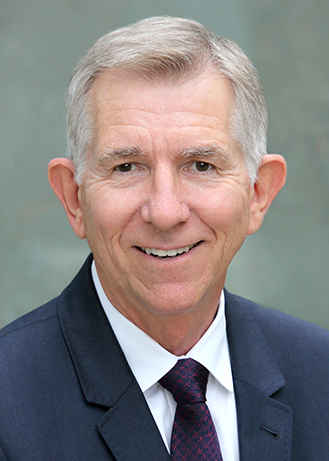The debate between active and passive managers has a long — and rich — history. But among the many eloquent public discourses presenting a well-reasoned and evidence-based approach to such a topic, one stands out to risk management professionals at Index Fund Advisors.
At a Charles Schwab investment conference in 1995, Rex Sinquefield — who had helped to develop one of the first market-capitalization weighted S&P 500 index funds and teamed with David Booth to launch Dimensional Fund Advisors — reflected on parallels between the benefits of free markets and passive investing.
In part, he observed that "It is well to consider, briefly, the connection between the socialists and the active managers." Sinquefield added:
"I believe they are cut from the same cloth. What links them is a disbelief or skepticism about the efficacy of market prices in gathering and conveying information."
He also noted: "So who believes markets don't work? Apparently it is only the North Koreans, the Cubans and the active managers."
Although his words came many years ago, IFA's Investment Committee considers these thoughts still highly relevant to investors today. Along those lines, below are excerpts edited for brevity and clarity from Sinquefield's opening statement in a debate with Donald Yacktman, at the time a veteran fund manager and very public proponent of active management. (Note: The text below is taken directly from the transcripts of his speech.)
Rex Sinquefield:
Now, let's start off by seeing if we can agree on what we are debating, discussing and disagreeing about. It's active versus passive management. Active management, as you know, is the art of stock picking and market timing. Passive management refers to a buy-and-hold approach to asset management, and, it can be applied to any asset class — big stocks, small stocks, foreign stocks, domestic stocks, value or growth.
All of these can be accessed by passive techniques. Neither label is perfect — there is not always a complete dichotomy between active and passive management.
Ultimately, this debate is about market behavior and investor behavior with respect to market behavior.
There are, at the extremes, two views. One is the well-known efficient market hypothesis, which says that prices are always fair and quickly reflective of information. In such a view, neither professional investors nor the proverbial "little investors" will be able to systematically pick winners — nor will they be able to systematically pick losers.
At the other extreme is what I like to call the market failure hypothesis. According to this view, prices react to information slowly enough to allow some investors, presumably professionals, to systematically outperform markets and most other investors.
At the level of investor behavior, this discussion deals with how a financial advisor should handle his or her clients' money.
It is my contention that active management does not make sense. Theoretically, it isn't justified empirically. And, it doesn't work for the client. Other than that, it's just fine.
But it's easy to understand the attraction and allure — the seductive power — of active management. It's fun and exciting to dip and dart and to pick stocks and time markets; to get paid high fees for this, and to do it all with someone else's money.
Passive management, on the other hand, stands on rather solid theoretical grounds, has enormous empirical support and works very well (for investors) ... Obviously, this is an idea that is here to stay. A rather impressive group of investors worldwide believes it is difficult to beat markets and it is better not to try. These investors are responding to a mountain of evidence that markets work. Such investors have concluded that in every asset class they choose, their best course of action is to accept market returns.
Where is this mountain of evidence? The 20th century has produced two grand experiments that bear directly on the question of whether markets work. One experiment took place on the geopolitical stage and the other in the halls of academia.
The intellectual origin for the role of free markets and the price system goes back to Adam Smith. He was the first to offer a comprehensive statement that markets work and that a free market is the best way for a social order to allocate resources. In his Wealth of Nations he shows that countries with such a system prosper and survive. Those without such a system do not.
Friedrich Hayek extended the work of Smith and tried to provide insight as to why and how the free market system works. The key idea is that the price system is a mechanism for communicating information. The knowledge that is relevant for producing any good or service is never possessed by a single individual or a single group. Rather, it is dispersed among many market participants. The price system acts to spread this knowledge and coordinate the actions of different individuals.
Hayek gives an example. Let's suppose that somewhere in the world there is a new use for some material — let's say silver. This is a sudden occurrence. Or, maybe an important source of supply has been elminated. It doesn't matter which of these two events has caused a new need for silver. All that is important is for the users of silver to know that it can be profitably employed elsewhere and silver has to be economized. It isn't necessarily that a majority of silver users know this new neeed. If only some know, they can direct silver to it highest use and fill-in from other sources of supply. This, in turn, will influence the other users and suppliers of silver, and the substitutes of silver, and so on. And all the while, the vast majority may be unaware of the original causes of these changes. The whole acts as one market, not because anyone surveys the whole field or knows all the facts, but because the participants' limited fields of vision sufficiently overlap and, through intermediaries, communicate the relevant information to all because there is only one price.
The law of one price, allowing for transport costs, means that had there been an all-knowing person possessing all the dispersed knowledge of the market, the solution that individual would have come to would have been exactly the solution that the market came to ...
As Hayek pointed out in his Nobel laureate lecture, we are only beginning to understand how subtle and efficient is the communication mechanism we call the market. It garners, comprehends and disseminates widely dispersed information better and faster than any system man has deliberately designed. But there is another side to this story, unfortunately.
The ideas advanced by Adam Smith were not the only ideas of his age. An abiding faith in the power of man's reason was augmented by successes in the physical sciences. From the middle of the 19th century to the 20th century, there was a growing belief among some intellectuals that man's success in the physical world could be applied to the social order as well. This was in part the intellectual genesis of the first grand experiment referred to earlier.
In 1917, much of the world began organizing itself — forcibly and brutally — on a belief that centrally administered prices and planning is superior to a system based on free market prices. Surely, a group of bright people by intelligent design and management could increase social welfare better than a system that was undesigned and unmanaged.
So, much of the world was subjected to socialism. But deprived of a mechanism to gather and disseminate the widely dispersed information on how to deploy society's resources for the production of goods and services — deprived of free market prices — it was inevitable that socialist countries would collapse.
In retrospect, it would be impossible to design a more controlled experiment at the geopolitical level than the one we witnessed for most of the 20th century. The verdict is in. The socialists have thrown in the towel. And in some of these countries, the new emergent hero is none other than Adam Smith. So who's left to say that markets don't work? It looks like it's only the North Koreans, the Cubans and the active managers.
Now let us consider the second big experiment, that which began in academia in the 1950s. The early work of Markowitz, Miller, Sharpe and Fama was transforming the field of finance from an ad hoc collection of courses to a serious and legitimate field of academic and scientific inquiry. Their work shaped and defined the field of finance and how the investigation of market activity would proceed over the next thirty years. They spelled out the idea of market efficiency and provided evidence on its behalf.
The notion of efficient markets was simply a specific application to the financial markets of the more general idea that free and competitive markets work. Most people in the Western world — and especially in the U.S. — are ardent defenders of free enterprise, which depends on the idea that markets work.
The literature on efficient markets over the last 30 years is a test of that proposition applied to the capital markets. The resounding success of these tests should bring joy to any fan of free markets. Debate about active management versus passive management began in earnest in the early 1970s.
Already by then, researchers had uncovered considerable evidence that past prices were of little benefit in forecasting future prices in ways that would earn excess profits; that fundamental data was too quickly reflected in prices to allow such data to be used for beat-the-market purposes; and, most importantly for us, that professional money managers could simply not outperform markets in any meaningful sense.
The latter tests are most pertinent for us, and of these, there is not one major published study that successfully claims that managers beat markets by more than one would expect by chance. Several key studies deserve brief mention.
In the first major study of bond market performance, three academics — (Christopher) Blake, (Edwin) Elton and (Martin) Gruber (Journal of Finance, Sept. 1995) — examine as many as 361 bond funds for the period starting in 1977. They compare the various active funds to simple index strategy alternatives.
The authors find that the active funds, on average, underperform the index strategies by 85 basis points (0.85%) a year. Depending on the benchmark, between 65 and 80 percent of the funds generate excess performance that is negative.In a study of equity mutual funds, Elton, Gruber, Hlavka and Das examine all funds that existed for the period of 1965-1984, 143 funds in all. These funds are compared to the set of index funds — big stocks, small stocks and fixed income — that most closely correspond to the actual investment choices made by the mutual funds.
The result: On average, these funds underperform the index funds by a whopping 159 basis points (1.59%) a year. Not a single fund generated positive performance that was statistically significant.
In (another) comprehensive study done ... a dissertation at the University of Chicago ... Mark Carhart studies a total of 1,892 funds that existed any time between 1961 and 1993. After adjusting for the common factors in returns, an equal-weighted portfolio of the funds underperformed by 1.8% per year.
These studies, along with earlier studies, provide a 50-year history of professional investment management. The message is clear: The beat-the-market efforts of professionals are impressively and overwhelmingly negative. In any asset class, the only consistently superior performer is the market itself.
It is well to consider, briefly, the connection between the socialists and the active managers. I believe they are cut from the same cloth. What links them is a disbelief or skepticism about the efficacy of market prices in gathering and conveying information. Fortunately, there is something that makes these two groups dissimilar as well.
The socialists, all too often, would impose their view on society, thus producing all the well-known painful consequences. The cost they impose is a public cost borne by nearly all members of a society. Active managers, on the other hand, are far more benign. They do their picking and timing, and because they do it too often, they impose costs on their clients. But the cost they impose is a private cost borne voluntarily by their clients.
But the bottom line is: Given all the evidence — from history, geopolitics and academia — it just doesn't make sense to believe markets don't work. It is no longer a credible position.
Finally, aside from these considerations of theory and evidence, there is a very practical advantage to passive management.
Passive management when applied to a client's entire portfolio is really asset class investing. This means investing literally in asset classes via passive portfolios that capture, in their entirety, the asset class or classes under consideration. For each asset class, there are typically a long time series of historical data that allow us to form reliable estimates of the risk of a given class, and, how closely the behavior of that class correlates with the behavior of other classes.
An advisor can estimate the risk of different combinations of asset categories and find the overall portfolio strategy that best suits the circumstances and risk tolerance of his or her client. Thus, a financial advisor can use historical data to form a long-run plan. That plan can be implemented exactly by investing in those same asset classes via passive (or asset class) portfolios.
A policy formed this way is easy to communicate, is verifiable — and is eminently defensible. But, in addition, as all studies to-date cogently show, such portfolios will outperform about 75% of all conventional portfolios.
But a financial advisor forfeits all of these advantages if he or she abandons passive investing. Actively managed portfolios seldom bear a reliable relation to any asset class. It is generally difficult to estimate future risk levels of actively managed portfolios, or to know how an active portfolio will relate to various asset classes in the future because such portfolios may experience radical shifts in their strategy.
Thus, it is nearly impossible to engage in or implement long-range planning if the inputs are actively managed portfolios.
In short, asset class investing is consistent with what we know about how free and fair markets function. Active management is not. Asset class investing is supported by the results of scores of empirical studies of fifty years of professionally managed portfolios. Active management is not.
Finally, asset class investing allows reliable planning and implementation of portfolio strategies. It is demonstrably successful and the most prudent way to invest a client's money.
This article is distributed for informational purposes, and it is not to be construed as an offer, solicitation, recommendation, or endorsement of any particular security, products, or services. There is no guarantee investment strategies will be successful. Investing involves risks, including possible loss of principal.
Source: Opening address by Rex Sinquefield at the Schwab Institutional conference in San Francisco (Oct. 12, 1995).
















